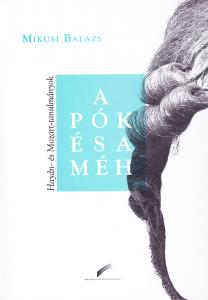
The Spider and the Bee
A pók és a méh. Haydn és Mozart tanulmányok (The spider and the bee. Studies on Haydn and Mozart)
Written by Balázs Mikusi
National Széchényi Library, Budapest, 2019
472 pages
ISBN 978-963-200-695-6
Why could Mozart’s acquaintances from Salzburg giggle at the minuet of the Haffner Serenade which is considered rather melancholic today? What is the point of singing the words ‘You take away the sins of the world’ in Haydn’s late mass to the sexually charged tune from his oratorio The Creation? The slow movement of Symphony No. 98 was really intended to be a requiem for Mozart’s death?
By answering such questions, Balázs Mikusi’s twenty-four studies provide an exceptionally intimate insight into the masterpieces of the Viennese classical era – that rich web of meanings that shapes up from intertextual references for the general public and professionals of the field and the biographical contexts that emerge in the background of the pieces. Some of the texts were inspired by the appearance of an important new document – a detailed report on the Mozart manuscript discovered in the National Széchényi Library a few years ago is issued here for the first time in Hungarian. However, most of the studies call attention to the obscure moments of a masterpiece in order to shed a light on new interpretations that transform the understanding of the composition as a whole. Thus, for example, the author’s first scientific publication, A pók és a méh (The Spider and the Bee), which gave the title of the volume as well, investigates how Mozart was included in Haydn’s The Seasons. All this creates a common context, a ‘bond’ between the two authors, already at the first study.
After studying music history at the Liszt Ferenc Academy of Music, Balázs Mikusi (1972) received his PhD as a Fulbright and DAAD Fellow at Cornell University (Ithaca, New York). On weekdays, he is the head of the Music Collection of the National Széchényi Library, outside working hours father of three children, and after bedtime he is the president of the Hungarian Musicological Society and the vice-president of the International Association of Music Libraries. He also tries to take time to write studies like the ones in this volume.
Shopping
Our publications are available in our bookshop, or can be ordered from the Publications Department of the NSZL using the contact details below: Főigazgatói Kabinet kiadványtára, Országos Széchényi Könyvtár, 1276 Budapest P.O. box 1205., phone: 06-1-23-23-506, e-mail: kiadvanytar@oszk.hu.




